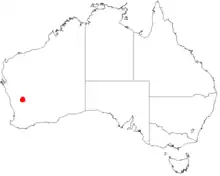| Gibson wattle | |
|---|---|
| Scientific classification | |
| Kingdom: | Plantae |
| Clade: | Tracheophytes |
| Clade: | Angiosperms |
| Clade: | Eudicots |
| Clade: | Rosids |
| Order: | Fabales |
| Family: | Fabaceae |
| Subfamily: | Caesalpinioideae |
| Clade: | Mimosoid clade |
| Genus: | Acacia |
| Species: | A. imitans |
| Binomial name | |
| Acacia imitans | |
 | |
| Occurrence data from AVH | |
Acacia imitans, also commonly known as Gibson wattle,[3] is a shrub belonging to the genus Acacia and the subgenus Phyllodineae that is endemic to south western Australia. It is a declared endangered species under the West Australian and Australian Acts,[2][4] and is on the IUCN Redlist.[3]
Description
The low dense spreading shrub typically grows to a height of 0.2 to 1.0 metre (0.7 to 3.3 ft) and to a width of 2.0 metres (6.6 ft)[2] and forms a dense canopy. It has smooth, linear, glabrous grey branchlets. Like most species of Acacia it has phyllodes rather than true leaves. The small asymmetric phyllodes have a sharp upturned point.[4] It blooms from August to September and produces yellow flowers.[2] The simple inflorescences with obloid to shortly cylindrical flower-heads with bright yellow flowers. The heads have a length of 6 to 8 mm (0.24 to 0.31 in) and a diameter of 4 to 5 mm (0.16 to 0.20 in).[4]
Distribution
It is native to a very small area around Yalgoo in the Wheatbelt region of Western Australia where it is often situated on rocky hills and grows in rocky red loamy soils[2] as a part of tall shrubland communities. It is known from six subpopulations around in the area around Mount Singleton that is situated about 300 km (190 mi) north east of Perth, four of these subpopulations are found about Ningham Station and two at Mount Gibson Station. The total population is estimated at 550 mature plants.[4]
Threats
It has an estimated area of occupancy of only 30 to 100 square kilometres,[3] and is threatened by grazing from sheep and feral goats, by inappropriate fire regimes, by possible mining, and by climate change.[3]
See also
References
- ↑ Williams, E. (2017). "Acacia imitans". IUCN Red List of Threatened Species. 2017: e.T22483967A22484227. doi:10.2305/IUCN.UK.2017-2.RLTS.T22483967A22484227.en. Retrieved 11 November 2021.
- 1 2 3 4 5 "Acacia imitans". FloraBase. Western Australian Government Department of Biodiversity, Conservation and Attractions.
- 1 2 3 4 Williams, E. 2017. Williams, E. (2017). "Acacia imitans". IUCN Red List of Threatened Species. 2017: e.T22483967A22484227. doi:10.2305/IUCN.UK.2017-2.RLTS.T22483967A22484227.en. Retrieved 11 November 2021.
- 1 2 3 4 Acacia imitans, Species Profile and Threats Database, Department of the Environment and Heritage, Australia.. Retrieved 16 November 2018.
